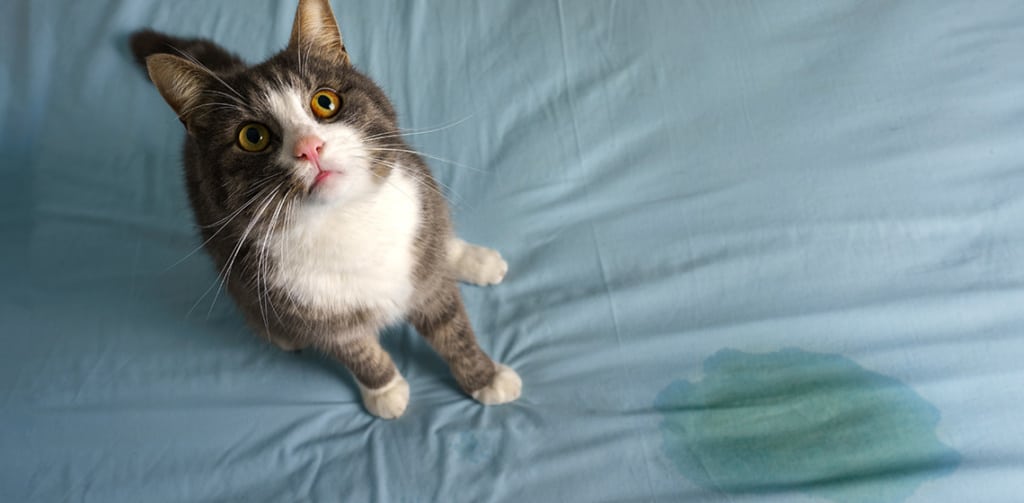If you live with a feline friend, you’ll know that there are many great things about owning a cat. They’re great at showing affection, they respond with a meow when you tell them about your day, and they curl up at the foot of the bed when you sleep…
Well, maybe some cats do! But one of the downsides of having a cat that you might have experienced is when they pee in places they shouldn’t. So, does your cat keep peeing on your bed, or in other areas you’d rather they didn’t?
If you’re tearing your hair out fearing the moment you next discover a suspicious wet patch and wondering what you can do about it, keep reading.
Table of Contents
What is inappropriate urination?
Inappropriate urination is when your cat pees in the house somewhere outside the litter box. Common places include the bed, the bathtub, tiled floors, carpeted floors, laundry piles, and quiet corners of the room. It even counts as inappropriate urination if they pee near their litter tray, but not quite in it!
What are the possible causes of inappropriate urination?
It may seem like laziness, carelessness, or just a bad attitude is causing your kitty to pass urine where they shouldn’t. But usually, there’s an underlying reason. Of course, this is a good thing because if there’s a reason, it typically means there’s something you or a traveling vet near you can do to help.
Stress
One of the main causes of inappropriate urination is stress and anxiety. This could be because you’ve brought home a new kitten or even a new baby. Perhaps you’ve bought a washing machine, and the new model is insanely louder than the old one. Or maybe your neighbors are having their house renovated. Any change in routine, including new noises, new smells, new people, or new pets, has the potential to cause your cat stress. This stress can sometimes lead to cystitis, inflammation of the bladder, causing your cat to pass urine more often. Alongside cystitis, stress might also cause your cat to hide more, and they might have bald patches or sore skin from overgrooming.
Not enough litter trays
If you don’t have enough litter boxes in your home to provide a clean, stress-free toileting facility to your furry friends, this could cause your cat to pee elsewhere. Cats are very clean animals, so toileting outside of the tray is a bit of a last resort. Still, if their litter box is dirty or smells like their feline housemates, they might feel they don’t have a choice. Don’t get too fixated on getting rid of litterbox smells, though; cats are just as sensitive to the strong smell of cleaning products and disinfectants!
One of the main causes of inappropriate urination is stress and anxiety.
Cystitis (or other urinary diseases)
If your cat has cystitis, bladder stones, or a urinary infection, they may need to pass more urine more frequently. If their bladder is sore, they may have the constant sensation that they need to pee, which means that accidents are more likely. If your cat has urinary disease, you might notice blood in their urine or that they’re passing less urine than usual. You might also see straining, and it might appear that they are constipated when actually their bladder is blocked. (By the way, if they really are constipated you might want to read this post on the best cat laxatives.)
Habit
Once a cat starts to pass urine in a particular place, they may continue to do so out of habit. After all, they might have chosen the spot in the first place because it’s quiet, and they feel safe and unthreatened. Once the area smells like their urine, it becomes even more of an attraction.
Illness
If your cat is feeling under the weather, their behavior might be affected. They may feel lethargic and might not want to move far from where they are lying. This can lead to some unfortunate accidents.
What can you do to help your cat’s inappropriate urination?
It’s not always best to try to deal with your cat’s inappropriate urination at home, and you should see a veterinarian if you’re concerned. However, below are some tips that might help stop your cat from peeing on the bed.
Provide more litter trays
A good rule of thumb to keep your cats stress-free in the bathroom department is to have one more litter tray than the number of cats you own. Cats don’t like to share, so this will allow them plenty of toilet options.
Clean litter trays regularly
As mentioned before, you shouldn’t go wild with the chemicals because cats aren’t keen on strong smells. That being said, regular removal of soiled litter and cleaning with mild cleaning products will help keep the litterboxes fresh.
Increase water intake
Increasing your cat’s water intake will dilute their urine and keep them regularly passing reasonable amounts of urine. This will make them less prone to cystitis and other urinary issues.
A good rule of thumb to keep your cats stress-free in the bathroom department is to have one more litter tray than the number of cats you own.
Reduce stress
Not all stress triggers will be under your control. For instance, it’s unlikely that you can pop next door and tell them to call off their building work, and there’s not much you can do if your neighbor’s new cat is causing your cat stress. However, once you’ve reduced the stress triggers as much as you can, you could try calming and anti-stress diffusers and sprays.
Training
If your cat is peeing on the bed out of habit and not for a medical reason, you’ll still need to make sure your litter box set up is up to snuff. However, once that’s done, you should thoroughly clean the area where your cat has been choosing to pee so that it no longer smells. You can find some tips to get rid of cat pee smell here. Once the area is clean, you can start to train your cat using treats or other tasty rewards when they use the litter tray. Remember to ignore any accidents though, because punishments or shouting will cause stress and worsen the problem.
Reduce their weight
One risk factor for urinary disease, especially in male cats, is obesity. So, if your cat is carrying a few extra pounds, speak to your veterinary team about how to start them on a safe diet.
When to see a vet
If your cat seems unwell in any way or has other symptoms aside from inappropriate urination, you should get them checked over by a veterinarian rather than trying to solve the problem at home. This is especially important if your cat isn’t passing any urine at all. A blocked bladder is a life-threatening emergency, so prompt treatment by a veterinarian is essential.
Conclusion
It’s not pleasant when your cat decides to use your bed as a toilet. But before you get angry, remember there are many things you can do to help stop this behavior. With the support of your veterinarian, you can reclaim your bed as your own!

Dr. Hannah Godfrey MRCVS graduated from the Royal Veterinary College in 2011. Although she initially worked in mixed practice treating all species, she found a love for small animal work and has worked exclusively with dogs and cats since 2014. She lives in Wales with her partner, son, and two cats (named Poppy and Ashton Kutcher), and writes comedy fiction in her spare time.








